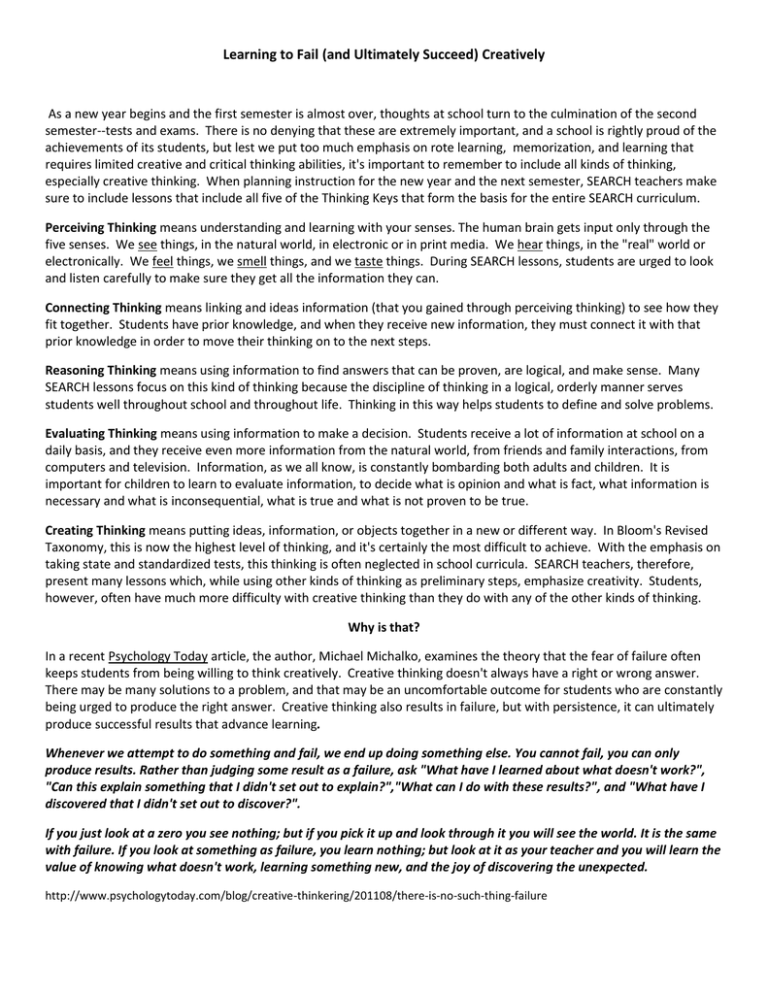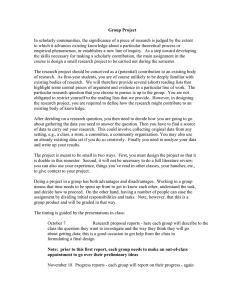Learning to Fail (and Ultimately Succeed) Creatively
advertisement

Learning to Fail (and Ultimately Succeed) Creatively As a new year begins and the first semester is almost over, thoughts at school turn to the culmination of the second semester--tests and exams. There is no denying that these are extremely important, and a school is rightly proud of the achievements of its students, but lest we put too much emphasis on rote learning, memorization, and learning that requires limited creative and critical thinking abilities, it's important to remember to include all kinds of thinking, especially creative thinking. When planning instruction for the new year and the next semester, SEARCH teachers make sure to include lessons that include all five of the Thinking Keys that form the basis for the entire SEARCH curriculum. Perceiving Thinking means understanding and learning with your senses. The human brain gets input only through the five senses. We see things, in the natural world, in electronic or in print media. We hear things, in the "real" world or electronically. We feel things, we smell things, and we taste things. During SEARCH lessons, students are urged to look and listen carefully to make sure they get all the information they can. Connecting Thinking means linking and ideas information (that you gained through perceiving thinking) to see how they fit together. Students have prior knowledge, and when they receive new information, they must connect it with that prior knowledge in order to move their thinking on to the next steps. Reasoning Thinking means using information to find answers that can be proven, are logical, and make sense. Many SEARCH lessons focus on this kind of thinking because the discipline of thinking in a logical, orderly manner serves students well throughout school and throughout life. Thinking in this way helps students to define and solve problems. Evaluating Thinking means using information to make a decision. Students receive a lot of information at school on a daily basis, and they receive even more information from the natural world, from friends and family interactions, from computers and television. Information, as we all know, is constantly bombarding both adults and children. It is important for children to learn to evaluate information, to decide what is opinion and what is fact, what information is necessary and what is inconsequential, what is true and what is not proven to be true. Creating Thinking means putting ideas, information, or objects together in a new or different way. In Bloom's Revised Taxonomy, this is now the highest level of thinking, and it's certainly the most difficult to achieve. With the emphasis on taking state and standardized tests, this thinking is often neglected in school curricula. SEARCH teachers, therefore, present many lessons which, while using other kinds of thinking as preliminary steps, emphasize creativity. Students, however, often have much more difficulty with creative thinking than they do with any of the other kinds of thinking. Why is that? In a recent Psychology Today article, the author, Michael Michalko, examines the theory that the fear of failure often keeps students from being willing to think creatively. Creative thinking doesn't always have a right or wrong answer. There may be many solutions to a problem, and that may be an uncomfortable outcome for students who are constantly being urged to produce the right answer. Creative thinking also results in failure, but with persistence, it can ultimately produce successful results that advance learning. Whenever we attempt to do something and fail, we end up doing something else. You cannot fail, you can only produce results. Rather than judging some result as a failure, ask "What have I learned about what doesn't work?", "Can this explain something that I didn't set out to explain?","What can I do with these results?", and "What have I discovered that I didn't set out to discover?". If you just look at a zero you see nothing; but if you pick it up and look through it you will see the world. It is the same with failure. If you look at something as failure, you learn nothing; but look at it as your teacher and you will learn the value of knowing what doesn't work, learning something new, and the joy of discovering the unexpected. http://www.psychologytoday.com/blog/creative-thinkering/201108/there-is-no-such-thing-failure


